Events of Interest
Call for Lightning Talk Presentations at CUNY DHI: Building a Digital Humanities Community at the City University of New York
On 12, Oct 2015 | In Events of Interest | By Mary Catherine Kinniburgh
Call for Lightning Talk Presentations at CUNY DHI: Building a Digital Humanities Community at the City University of New York
We are now accepting presentation proposals that highlight ongoing, current, and recent digital humanities work across The City University of New York, and would like to encourage you to consider participating. All disciplines, all research, and all students, faculty, and staff are welcome to attend and present.
The event is scheduled for Tuesday, November 10th, 6:30-8:30pm at The Graduate Center. Please plan to speak for no more than five minutes. Groups may present collaboratively or with a representative. Proposals may be submitted through the following form: http://goo.gl/forms/mF6oPcEqfs. Once you have completed the form, we will contact the email address provided with further details. Thank you for your interest in participating, and we look forward to seeing you there.
For specific questions, please do not hesitate to contact us at [email protected] or [email protected].
Sponsored by CUNY DHI and GC Digital Initiatives.
MEDIA RES #1: lightning talks by NYC graduate students on DH projects
On 07, May 2015 | In Events of Interest | By Erin Glass
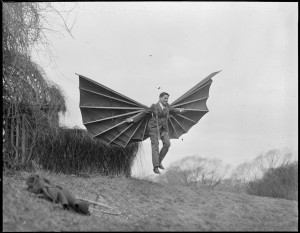 TIME: 2:00 – 3:30 pm, Friday, May 8th, 2015
TIME: 2:00 – 3:30 pm, Friday, May 8th, 2015
ROOM: CUNY Graduate Center, Room C415A
FOCUS: English & Literary Studies
NYC has more graduate students executing projects in the digital humanities than perhaps anywhere else in the world. Even so, few venues exist that make visible the diverse set of methods, philosophies, and inquiries that drive this graduate student work in English Studies. Media Res #1 will present a wide array of approaches to theoretically-informed questions through a series of 12 five-minute lightning talks by graduate students doing student-driven digital humanities research in NYC. These talks and the subsequent discussions the talks engender will serve as a useful entry to point into DH for students who might otherwise not know where to start. Equally important, Media Res #1 will foster a burgeoning network of graduate student scholars working across academic institutions to collaborate on intellectual inquiry, share knowledge and practical expertise in DH, and inspire confidence and mutual support. This event will conclude with a moderated discussion inviting speakers and audience alike to explore how universities might better support and promote ongoing student-driven DH work.
While Media Res #1 highlights student DH projects in English and literature, future Media Res events will explore DH work in different disciplines, formats, and venues. Any questions or suggestions for future Media Res events should be directed to Erin Glass ([email protected]) or Aaron Plasek ([email protected]).
Panelists include: Jeffrey Binder (Graduate Center), Mary Catherine Kinniburgh (Graduate Center), Patrick Smyth (Graduate Center), Jojo Karlin (Graduate Center), Erin Glass (Graduate Center), Julia Fuller (Graduate Center), Chris Vitale (Graduate Center), Jesse Merandy (Graduate Center), Collin Jennings (NYU), Grace Afsari-Mamagani (NYU), Jon Reeve (NYU), Aaron Plasek (NYU & Columbia), and Christy Pottroff (Fordham).
Evaluating, Valuing, and Promoting Digital Scholarship
On 14, Apr 2015 | In Events of Interest, Uncategorized | By A.L. McMichael
The GC Digital Initiatives, CUNY DHI, and the GC Digital Fellows invite you to join us for a panel and discussion on Evaluating, Valuing, and Promoting Digital Scholarship.
It will be on April 21, 2015 at The Graduate Center in Room 9204 from 6:30-8:30 pm. Note: the event will be livestreamed.
Digital resources and methods are deeply embedded in academic research. However, processes for evaluation, peer review, and assessment projects that include digital scholarship have not kept pace with the technological and methodological changes that have altered research practices in many academic disciplines. Often, those not directly involved in digital projects are hesitant to use and assess them, especially if they are not familiar with the theoretical basis for a particular digital undertaking. In addition, digital work tends to be collaborative and interdisciplinary, offering new challenges for measuring the contributions of individuals. This panel is for both the enthusiastic and the skeptical, speaking both to those interested in creating and presenting digital work and those wishing to better understand and assess the digital scholarship of their colleagues.
- Steven Jones
- Sonia Gonzalez
- Elizabeth Macaulay-Lewis
- Chris Allen Sula
- Amanda Visconti
Steven Jones, Professor of English and Co-Director, and Co-Director of the Center for Textual Studies and Digital Humanities, Loyola University Chicago, “Welcome to the Interdiscipline”
Sonia K. González, MPH, DPH candidate in the CUNY School of Public Health, and Assistant Program Officer, Interactive Technology and Pedagogy Certificate, “There’s an App for That, But Does It Work? Development of the Evaluation of a Sexual Health Mobile-Based App”
Elizabeth Macaulay-Lewis, Visiting Assistant Professor and Deputy Executive Officer, MA in Liberal Studies, The Graduate Center, CUNY, “Digital Digs: Training Archaeologists and Evaluating Digital Archaeology in the 21st Century”
Chris Allen Sula, Assistant Professor, Pratt Institute, School of Information & Library Science, “Methods, Disciplines, and Evaluating Scholarly Work in the Digital Humanities”
Amanda Visconti, PhD, University of Maryland, Literature and Digital Dissertation Fellow at Maryland Institute for Technology in the Humanities (MITH), “Assessing Digital Humanities Dissertations: How to Plan, Track Progress, and Evaluate Work that Doesn’t Develop in Chapters”
A.L. McMichael, PhD candidate in Art History and GC Digital Fellow at The Graduate Center, CUNY, will be panel moderator. The panel will include brief talks by the digital scholars followed by discussion and audience questions.
This event will be Livestreamed! Click here for more information.
This event is co-sponsored by the the Futures Initiative, the New Media Lab, the ITP Certificate Program, and the Futures Initiative. It is free and open to the public. The Graduate Center is located at 365 Fifth Avenue, NYC.
Fall 2014 Speaker Series
On 03, Sep 2014 | In Events of Interest, Meetings | By Amanda Licastro
The CUNY Digital Humanities Initiative is happy to announce our Fall 2014 Speaker Series. All events are free and open to the public.
- Thursday, Sept 4, 4-6pm, Room 5318 : Elizabeth Maddock-Dillon on “Radical Archival Practices and the Digital Humanities: the Early Caribbean Archive”
- Thursday, Sept 11, 6:30-8:30pm, Room 5409 : Cheryl Ball, West Virgina University, on Making the Case for Scholarly Multimedia, co-sponsored with the GC Composition Community.
- Friday, Oct 10, 4:00pm, Room 4406: What Is a Dissertation? New Models, New Methods, New Media, a panel including: Jade E. Davis, Communications, University of North Carolina, Dwayne Dixon, Anthropology, Duke University, Gregory T. Donovan, Communication and Media Studies, Fordham University, Amanda Licastro, English, Graduate Center, CUNY, and Nick Sousanis, Teachers College, Columbia University.
- Wednesday, Oct 15, 6:30pm, Room C198: Destruction and Documentation: Saving Syria’s Cultural Heritage, Elizabeth Macaulay-Lewis, The Graduate Center, CUNY. Co-sponsored with the Center of Humanities.
- TBA: A showcase of CUNY Digital Humanities projects across the campuses
Thursday, Sept 11, 6:30pm : Cheryl Ball on Making the Case for Scholarly Multimedia
On 02, Sep 2014 | In Events of Interest, Meetings | By Amanda Licastro
The CUNY Digital Humanities Initiative is pleased to announce Dr. Cheryl E. Ball, West Virginia University, will join us for a presentation and workshop on “Making the Case for Scholarly Multimedia.” This event is co-sponsored by the Graduate Center Composition Community. We encourage participants to bring their works-in-progress to workshop as webtext submissions to Kairos. This event is free and open to the public, and will take place in room 5409 of the Graduate Center.
Please RSVP to [email protected]
Thursday, Sept 11, 6:30pm, Room 5409 : Cheryl Ball on Making the Case for Scholarly Multimedia
In this presentation/workshop, Dr. Ball will briefly overview what “scholarly multimedia” is, the kinds of peer-reviewed journals it is published in, and how it relates to others kinds of digital humanities and digital media projects. Following this introduction, Ball will focus on helping participants make the case for their (or others’) digital media-based work through an interactive assessment workshop. We will start with a single webtext, go through some of the developmental and evaluative stages of feedback that Ball uses at Kairos, and spin that example out into relevant cases and questions the workshop participants might have.
 Cheryl E. Ball is Associate Professor of Digital Publishing Studies at West Virginia University and editor of Kairos: A Journal of Rhetoric, Technology, and Pedagogy. She teaches classes in editing, multimedia authoring, and digital publishing and teaches occasional seminars on academic literacies at the Oslo School of Architecture and Design, where she was a Fulbright scholar in 2013-14. Ball has published articles in Classroom Discourse, Computers and Composition, C&C Online, Fibreculture, Convergence, Hybrid Pedagogy, Kairos, Programmatic Perspectives, Technical Communication Quarterly, and Writing & Pedagogy. She has also published several books, including The New Work of Composing (co-edited with Debra Journet and Ryan Trauman), which won the C&C Distinguished Book Award in 2013, and the RAW: Reading and Writing New Media (co-edited with Jim Kalmbach). Her textbooks include ix: visual exercises and Writer/Designer: A Guide to Making Multimodal Projects (with Kristin Arola and Jenny Sheppard).
Cheryl E. Ball is Associate Professor of Digital Publishing Studies at West Virginia University and editor of Kairos: A Journal of Rhetoric, Technology, and Pedagogy. She teaches classes in editing, multimedia authoring, and digital publishing and teaches occasional seminars on academic literacies at the Oslo School of Architecture and Design, where she was a Fulbright scholar in 2013-14. Ball has published articles in Classroom Discourse, Computers and Composition, C&C Online, Fibreculture, Convergence, Hybrid Pedagogy, Kairos, Programmatic Perspectives, Technical Communication Quarterly, and Writing & Pedagogy. She has also published several books, including The New Work of Composing (co-edited with Debra Journet and Ryan Trauman), which won the C&C Distinguished Book Award in 2013, and the RAW: Reading and Writing New Media (co-edited with Jim Kalmbach). Her textbooks include ix: visual exercises and Writer/Designer: A Guide to Making Multimodal Projects (with Kristin Arola and Jenny Sheppard).
Thurs, April 10th, 7-9pm: Lauren Klein “The Long Arc of Visual Display”
On 02, Apr 2014 | In Events of Interest | By Amanda Licastro
Please join CUNY DHI in welcoming Graduate Center alumnus Lauren Klein to present “The Long Arc of Visual Display” on Thursday, April 10th from 7-9pm in room 9207.
This event is free and open to the public, but we ask that you RSVP here: https://www.eventbrite.com/e/lauren-klein-the-long-arc-of-visual-display-tickets-11172550399
This event will be live-streamed and live tweeted (follow @cunydhi and use #cunydhi).
““The Long Arc of Visual Display”
We live in what’s been called the “golden age” of data visualization, and yet, the graphical display of quantitative information has a long history, one that dates to the Enlightenment and arguably before. This talk will explore the origins and applications (both historical and contemporary) of data visualization techniques, locating the emergence of the visualizing impulse in eighteenth-century ideas about data, evidence, and observation. By illuminating these ideas at work in examples past and present, Lauren Klein will show how we can begin to identify the arguments—political as much as aesthetic—that underlie all instances of visual display. In so doing, she will also demonstrate how the digital humanities, through the incorporation of ideas from the fields of media studies, information visualization, and the history of science, might be expanded to consider how data might be conceptualized, visualized, and deployed in order to advance humanistic critique.
 Lauren Klein is Assistant Professor in the School of Literature, Media, and Communication at Georgia Tech. She received her A.B. from Harvard University and her Ph.D. from the Graduate Center of the City University of New York (CUNY). Her research interests include early American literature and culture, food studies, media studies, and the digital humanities. Her writing has appeared in American Literature, Early American Literature, and American Quarterly. She has taught at Brooklyn College and at Macaulay Honors College, both branches of CUNY. Between 2007 and 2008, she worked as an educational technology consultant for One Laptop per Child, a non-profit aimed at bringing low-cost laptops to children in the developing world.
Lauren Klein is Assistant Professor in the School of Literature, Media, and Communication at Georgia Tech. She received her A.B. from Harvard University and her Ph.D. from the Graduate Center of the City University of New York (CUNY). Her research interests include early American literature and culture, food studies, media studies, and the digital humanities. Her writing has appeared in American Literature, Early American Literature, and American Quarterly. She has taught at Brooklyn College and at Macaulay Honors College, both branches of CUNY. Between 2007 and 2008, she worked as an educational technology consultant for One Laptop per Child, a non-profit aimed at bringing low-cost laptops to children in the developing world.
Tanya Clement– 3/5/14, 6:30-8:30 : “HiPSTAS, What?: Information Retrieval, Machine Learning, and Visualizations with Sound”
On 26, Feb 2014 | In Events of Interest | By Amanda Licastro
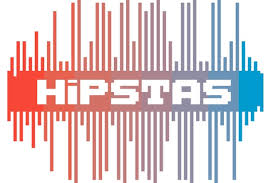 Even digitized, unprocessed sound collections, which hold important cultural artifacts for the humanities such as poetry readings, story telling, speeches, oral histories, and other performances of the spoken word remain largely inaccessible.In order to increase access to recordings of significance to the humanities, Tanya Clement at the University of Texas School of Information in collaboration with David Tcheng and Loretta Auvil at the Illinois Informatics Institute at the University of Illinois, Urbana Champaign have developed the HiPSTAS (High Performance Sound Technologies for Access and Scholarship), which is currently being funded by an NEH Institute for Advanced Topics in the Digital Humanities grant and an NEH Preservation and Access Grant to develop and evaluate a computational system for archivists, librarians, and humanists for discovering and analyzing sound collections. The main premise behind HiPSTAS is that if we don’t use sound collections, we will not preserve. To this end, HiPSTAS has brought together humanists interested in sound scholarship, stewards of sound collections, and computer scientists and technologists versed in computational analytics and visualizations of sound to develop more productive tools for advancing scholarship in spoken text audio. This talk will introduce the project, the participants, and the processes and share early results.
Even digitized, unprocessed sound collections, which hold important cultural artifacts for the humanities such as poetry readings, story telling, speeches, oral histories, and other performances of the spoken word remain largely inaccessible.In order to increase access to recordings of significance to the humanities, Tanya Clement at the University of Texas School of Information in collaboration with David Tcheng and Loretta Auvil at the Illinois Informatics Institute at the University of Illinois, Urbana Champaign have developed the HiPSTAS (High Performance Sound Technologies for Access and Scholarship), which is currently being funded by an NEH Institute for Advanced Topics in the Digital Humanities grant and an NEH Preservation and Access Grant to develop and evaluate a computational system for archivists, librarians, and humanists for discovering and analyzing sound collections. The main premise behind HiPSTAS is that if we don’t use sound collections, we will not preserve. To this end, HiPSTAS has brought together humanists interested in sound scholarship, stewards of sound collections, and computer scientists and technologists versed in computational analytics and visualizations of sound to develop more productive tools for advancing scholarship in spoken text audio. This talk will introduce the project, the participants, and the processes and share early results.
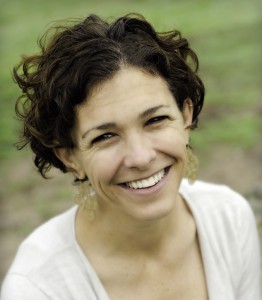 Tanya Clement is an Assistant Professor in the School of Information at the University of Texas at Austin. She has a PhD in English Literature and Language and an MFA in fiction. Her primary area of research centers on scholarly information infrastructure as it impacts academic research, research libraries, and the creation of research tools and resources in the digital humanities. She has published in American Literary History, Digital Humanities Quarterly, Digital Studies / Le champ numérique, Jacket2, the Journal of the Text Encoding Initiative, Library Quarterly, Literary and Linguistic Computing, and Texas Studies in Literature and Language. Some of her digital projects include High Performance Sound Technologies for Access and Scholarship (HiPSTAS) (http://blogs.ischool.utexas.edu/hipstas/), which has received funding from the National Endowment for the Humanities, and ProseVis (http://tclement.ischool.utexas.edu/ProseVis/), which was awarded “Best Infovis” in the 2012 Digital Humanities Awards as part of the NEH-funded “A Thousand Words: Advanced Visualization for the Humanities” project at the Texas Advanced Computing Center (TACC).
Tanya Clement is an Assistant Professor in the School of Information at the University of Texas at Austin. She has a PhD in English Literature and Language and an MFA in fiction. Her primary area of research centers on scholarly information infrastructure as it impacts academic research, research libraries, and the creation of research tools and resources in the digital humanities. She has published in American Literary History, Digital Humanities Quarterly, Digital Studies / Le champ numérique, Jacket2, the Journal of the Text Encoding Initiative, Library Quarterly, Literary and Linguistic Computing, and Texas Studies in Literature and Language. Some of her digital projects include High Performance Sound Technologies for Access and Scholarship (HiPSTAS) (http://blogs.ischool.utexas.edu/hipstas/), which has received funding from the National Endowment for the Humanities, and ProseVis (http://tclement.ischool.utexas.edu/ProseVis/), which was awarded “Best Infovis” in the 2012 Digital Humanities Awards as part of the NEH-funded “A Thousand Words: Advanced Visualization for the Humanities” project at the Texas Advanced Computing Center (TACC).
Simone Browne on Race, Surveillance, and Technology – Mon 12/9, 4:15pm-5:30pm, Skylight Room (9100)
On 26, Nov 2013 | In Events of Interest | By Laura Kane
Please join CUNY DHI and the Digital Praxis Seminar for a talk by Simone Browne on race, surveillance, and technology.
This lecture will be livestreamed at 4:15pm on Dec. 9, 2013
Dark Sousveillance: Surveillance, Race and Resistance
Since its emergence, surveillance studies has been primarily concerned with how and why populations are tracked, profiled, policed, and governed at state borders, in cities, at airports, in public and private spaces, through biometrics, closed-circuit television, identification documents, social media and other technologies. Also of focus are the many ways that those who are often subject to surveillance subvert, adopt, endorse, invite, resist, innovate, limit, comply with and monitor that very surveillance. As an interdisciplinary field of study the questions that shape surveillance studies center on the management of everyday and exceptional life – personal data, privacy, security, and terrorism, for example. While “race” might be a term found in the index of many of the recent edited collections and special journal issues dedicated to the study of surveillance, within the field questions of Blackness remain under-theorized.
Situating Blackness as an absented presence in the field of surveillance studies, this talk questions how the intimate relation between branding and the black body – our biometric past – can allow us to think critically about our biometric present.
About the Speaker
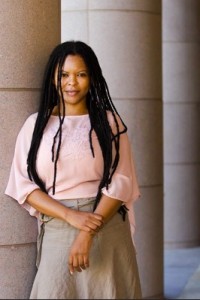 Simone Browne is Assistant Professor in the Department African and African Diaspora Studies at the University of Texas at Austin. She teaches and researches surveillance studies, biometrics, airport protocol, popular culture, digital media and black diaspora studies.
Simone Browne is Assistant Professor in the Department African and African Diaspora Studies at the University of Texas at Austin. She teaches and researches surveillance studies, biometrics, airport protocol, popular culture, digital media and black diaspora studies.
Tom Scheinfeldt, “Making Hay: Lessons in Collaboration from One Week | One Tool ” – Mon 11/25, 4:15pm-5:30pm, Skylight Room (9100)
On 19, Nov 2013 | In Events of Interest | By Laura Kane
Please join CUNY DHI and the Digital Praxis Seminar for a talk by Tom Scheinfeldt on DH Project Management.
Making Hay: Lessons in Collaboration from One Week | One Tool
Digital Humanities projects are rarely blessed with abundant, or even
adequate, resoruces. Staff, skills, equipment, and money are almost
always tight. The experience of One Week | One Tool
(http://oneweekonetool.org), an NEH Institute for Advanced Topics in
Digital Humanties, demonstrates that time and resource constraints can
be made to work in a project’s favor. First in 2010 and again in 2013,
One Week | One Tool brought together a diverse group of academic and
cultural professionals to conceive, plan, build, and launch an open
source software tool in only seven days. Despite, or perhaps because
of, these strict contraints, both groups succeeded in releasing what
have proved to be extremely well-used tools for humanities research:
Anthologize and Serendip-o-matic. This talk will explore some of the
lessons learned from One Week | One Tool for collaboration and project
management in digital humanities and the academic work at large.
About the Speaker
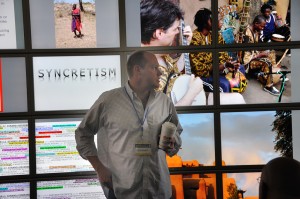 Tom Scheinfeldt is Associate Professor of Digital Media and Design and Director of Digital Humanities in the Digital Media Center at the University of Connecticut. Formerly Managing Director of the Roy Rosenzweig Center for History and New Media at George Mason University, Tom has directed several award-winning digital humanities projects, including THATCamp, Omeka, and the September 11 Digital Archive. Trained as an historian of science and public historian with a bachelor’s degree from Harvard and master’s and doctoral degrees from Oxford, Tom has written and lectured extensively about the history of museums and the role of history in culture. Among his publications, Tom is a recent contributor to Debates in Digital Humanities (University of Minnesota Press) and co-editor of Hacking the Academy (University of Michigan Press). Tom blogs about digital humanities and the business of digital humanities at Found History and co-hosts the Digital Campus podcast will his colleagues Dan Cohen, Amanda French, Mills Kelly, and Stephen Robertson. You can follow Tom on Twitter (@foundhistory) and LinkedIn (http://www.linkedin.com/in/tomscheinfeldt/).
Tom Scheinfeldt is Associate Professor of Digital Media and Design and Director of Digital Humanities in the Digital Media Center at the University of Connecticut. Formerly Managing Director of the Roy Rosenzweig Center for History and New Media at George Mason University, Tom has directed several award-winning digital humanities projects, including THATCamp, Omeka, and the September 11 Digital Archive. Trained as an historian of science and public historian with a bachelor’s degree from Harvard and master’s and doctoral degrees from Oxford, Tom has written and lectured extensively about the history of museums and the role of history in culture. Among his publications, Tom is a recent contributor to Debates in Digital Humanities (University of Minnesota Press) and co-editor of Hacking the Academy (University of Michigan Press). Tom blogs about digital humanities and the business of digital humanities at Found History and co-hosts the Digital Campus podcast will his colleagues Dan Cohen, Amanda French, Mills Kelly, and Stephen Robertson. You can follow Tom on Twitter (@foundhistory) and LinkedIn (http://www.linkedin.com/in/tomscheinfeldt/).
Katina Rogers on Alt-Academic Careers: Mon 11/18, 4:15p-5:30p Rooms 9204/9205
On 11, Nov 2013 | In Events of Interest | By Laura Kane
Please join CUNY DHI and the Digital Praxis Seminar for a talk by Katina Rogers on Alt-Academic Careers.
Katina Rogers – Alt-Academic Careers
While many graduate programs continue to focus on tenure track placement rates, a growing proportion of humanities scholars are embracing a much broader range of intellectually stimulating careers in, around, and beyond the academy. Focusing both on her own career path and on her research at the Modern Language Association, the Scholarly Communication Institute, and the Scholars’ Lab at the University of Virginia, Katina Rogers will discuss strategies to support professionalization, public scholarship, and career development across a wide array of possible outcomes.
About the Speaker
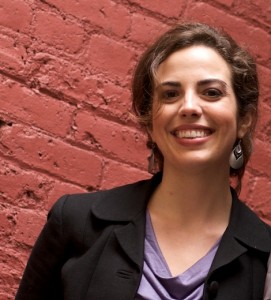 Katina Rogers is managing editor of MLA Commons, the Modern Language Association’s new online platform for collaboration and scholarly communication. She previously served as Senior Research Specialist with the Scholarly Communication Institute, a Mellon-funded humanities think tank based in the University of Virginia’s Scholars’ Lab. Her current research focuses on graduate education reform, career paths for humanities scholars, and innovative modes of scholarly production. Katina holds a Ph.D. in Comparative Literature from the University of Colorado.
Katina Rogers is managing editor of MLA Commons, the Modern Language Association’s new online platform for collaboration and scholarly communication. She previously served as Senior Research Specialist with the Scholarly Communication Institute, a Mellon-funded humanities think tank based in the University of Virginia’s Scholars’ Lab. Her current research focuses on graduate education reform, career paths for humanities scholars, and innovative modes of scholarly production. Katina holds a Ph.D. in Comparative Literature from the University of Colorado.







 Welcome to the blog of the CUNY DHI, an effort to build momentum and community around Digital Humanities practitioners at CUNY. We hope you'll join us at our upcoming events and that you'll follow this blog to hear about the latest news in the field.
Welcome to the blog of the CUNY DHI, an effort to build momentum and community around Digital Humanities practitioners at CUNY. We hope you'll join us at our upcoming events and that you'll follow this blog to hear about the latest news in the field.



Recent Comments